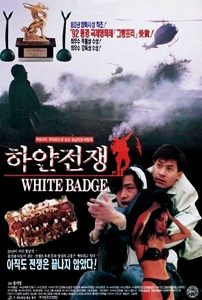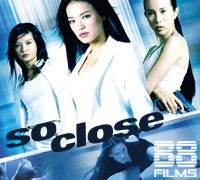Director: Chung Ji-young
Cast: Ahn Sung-ki, Lee Geung-young, Shim Hye-jin, Ahn Do-Hun, Dok Ko Yeong Jae, Heo Jun-Ho
Running Time: 124 min.
By Paul Bramhall
When you think of Korean war movies, chances are the titles that spring to mind are ones that take place in the (no irony intended) Korean War. From the likes of 2004’s Taegukgi, through to 2011’s The Front Line, the war which ended with an amnesty splitting the Korean peninsula in two understandably provides fertile ground for storytelling. An element of Korean history which its film industry rarely chooses to focus on though, is South Korea’s participation in the Vietnam War, a decade after the ceasefire was achieved in Korea. The scarcity of productions which cover this era of Korea’s military makes the ones that do exist all the more interesting, from the 1990 drama A Saigon Too Far, to the 2004 horror R-Point, the backdrop of Vietnam provides a unique aesthetic that allows for some equally unique storytelling.
It could be argued the industries lack of enthusiasm to use the Vietnam War as a backdrop, is most likely due to the countries own feelings towards its involvement in the conflict. South Korea was the 2nd largest foreign military presence in Vietnam after the U.S. Accepting an invite from the U.S. forces to join in return for economic aid, South Korea’s role in the war would play a critical part in boosting its economy, and elevating its status to a developed country at an alarmingly fast rate. However there was a dark side to their participation, with the U.S.’s financial incentives linked directly to participation in combat, which essentially meant the U.S. was recruiting Korean civilians as an army of mercenaries. This approach resulted in Korean units reportedly committing some of the worst atrocities in Vietnam, however in subsequent years both countries have expressed a desire to not dwell on the past.
One director who’s never been afraid to hold up a mirror to the uglier side of Korean history though, is Chung Ji-young, and in the 1992 production White Badge, that’s what he did with the Vietnam War. Ji-young has been active in the film industry since the early 80’s, however it was once Korea escaped from the military dictatorship of Chun Doo-hwan, that he began to develop a talent for tackling his countries own complicated internal conflicts. His 1990 movie North Korean Partisan in South Korea told the story of the Korean War from the perspective of a North Korean, pairing him up with lead actor Ahn Sung-ki for the first time, and they’d reunite 2 years later for White Badge. As an interesting side note, the pair would reunite for a third time in 2011 for Unbowed, which was Ji-young’s first movie after a 13 year hiatus. His return was deservedly awarded with the Best Director at the 2012 Blue Dragon Film Awards.
In White Badge he adapts the novel of the same name by Ahn Jung-hyo (no relation to Ahn Sung-ki), which was published in 1983. The idea of making a movie from the source material actually came from Sung-ki, who after enjoying working with Ji-young on North Korean Partisan in South Korea, proposed the idea to the director for his next production. The plot opens in 1979 against the backdrop of Park Jung-hee being assassinated, with Sung-ki playing a novelist who’s seen better days. With the newspaper his editor friend runs hesitant to cover the political turmoil in too much detail, for fear of inciting the wrath of the military, the editor suggests that Sung-ki writes a series covering his time in Vietnam. Initially reluctant, but also aware that he needs a salary, he agrees to the proposal, forcing himself to dig up old memories he’d rather keep forgotten.
The publication of the series inadvertently draws the attention of one of Sung-ki’s former platoon members, played by Lee Kyung-young (Steel Rain), and the pair become reconnected after losing touch since returning to Korea. However it becomes clear that the war has affected the pair in greatly different ways. Whereas Sung-ki’s marriage has fallen apart, and he’s become what can best be described as a functioning alcoholic, the psychological impacts of war are very much visible in Kyung-young, whose jumpy demeanour has him constantly on edge. The story of Sung-ki and Kyung-young reconnecting runs in parallel to flashback scenes that take place in Vietnam, where they served together in the same unit, as we follow them from their beginnings digging trenches and complaining of how bored they are, to the hellish reality of what it means to kill.
Ji-young balances both the present day narrative and the Vietnam flashbacks with a deft hand, with the events of the past slowly revealing the layers of how our protagonists ended up as they are in the present. The psychological burden of the Vietnam War is one that’s been explored plenty of times in war movies through the years. From John Rambo in First Blood, to the trio of Michael Cimino’s The Deer Hunter (of which the poster features in White Badge), however it’s refreshing to see the perspective switched to that of Korea. Whereas the U.S. forces believed they were there to help, many South Koreans volunteered out of a feeling that they were indebted to the U.S. for their assistance in the Korean War, whereas others were incentivised through the monetary awards offered for killing Viet Cong. It’s the latter that White Badge zooms in on during certain scenes, making for sometimes uncomfortable viewing.
The narrative doesn’t shy away from civilian killings, and during the initial screenings of White Badge there were reports of Vietnam veterans walking out. The realistic approach is an admirable one, and at no point do any of the soldiers become villainised for the audience, but rather feel like people who’ve been pushed to the limit of what they can handle. The rest of the platoon is played by various familiar faces that would continue acting into the era of the Korean Wave, such as Heo Joon-ho (Volcano High) and Hong Suk-yun (Crying Fist), many playing against type when compared to the roles they’d eventually become known for. While the performances can be a little broad early on (in one scene the commander presents a photo of his sister, with the offer that she’ll be a pen-pal to one of them, which leads to him ordering the candidates to strip so he can inspect their crown jewels), the relationship between them still resonates.
Credit has to be given for the way Ji-young effectively incorporates a technique which I usually furrow my brow at, that of the flashback within the flashback. During some of the scenes set in Vietnam, Sung-ki’s memories of the American soldiers he witnessed during the Korean War, are juxtaposed against the way he finds his own platoon behaving in the present day. While used sparingly, these scenes contain some of White Badge’s most powerful imagery. In one scene the memory of watching American soldiers aggressively shoo away Korean kids scavenging for food around their army base, is played against a scene of the Korean soldiers shoving away Vietnamese kids, who’ve come to protest after their cattle were mistakenly killed during the night. While the comparison may lack subtlety, and the point of the futility of war an obvious one, the scenes still hits home thanks to the honesty with which they’re portrayed.
While the battle scenes may not be able to match the technical bombast of more recent efforts, the frantic camerawork and palpable sense of panic combine to add a distinct ‘in the moment’ feel to the skirmishes, which often unfold without warning. Unlike many war movies, here every bullet and grenade feels like it has consequences behind it, and as a viewer you get the strong impression Ji-young wanted to emphasise that there are no heroics in war, only desperate survival. It struck me more than once while watching White Badge, that it felt like the anti-thesis to John Woo’s Bullet in the Head, which had been released a couple of years prior.
For fans of both war movies and Korean cinema, White Badge remains an underseen gem, and is worth seeking out. Made at a time when South Korea itself was enjoying its initial years of finally being a real democracy, it’s a production which finds a director reflecting on his countries role in the Vietnam War, as well as how it got to where it currently was at the time. While in recent years movies like Ode to My Father have taken a romanticized look at the same events, Ji-young’s unflinching approach maybe more confronting, but it’s also more rewarding for the viewer. At the end of the day, that’s what movies are about.
Paul Bramhall’s Rating: 8/10
Enjoy a clip from the film below (beware of spoilers):





Very intriguing. I take a serious interest in war crimes of history, and had no idea of South Korea’s involvement in Vietnam. Were trials ever held?
I’ll have to seek out White Badge.
I don’t believe there ever was a trial, but don’t quote me on that one. There’s a fairly comprehensive overview of South Korea’s role in the Vietnam War over on Wikipedia, which is worth checking out for a more detailed overview.
The good news is ‘White Badge’ was released on Blu-ray in June. Here’s a link to it on yesasia.
Oh my god, THANK YOU for the good news about that Bluray release! I have been waiting for YEARS for this to come out, and it even has English subtitles. FINALLY.
White Badge is indeed a hidden gem and doesn’t need to hide itself from genre milestones such as Platoon, The Deer Hunter or Full Metal Jacket. It is a punch into your guts and the ending leaves you thinking about the movie for a long time afterwards.
If you enjoyed the movie you owe to yourself to read the novel as well:
https://www.amazon.com/White-Badge-Junghyo-Ahn/dp/1569470049
While the movie adaption is really good already, the novel is fairly superior in all aspects. The author himself was a veteran from the White Horse division who served in Vietnam at the time.